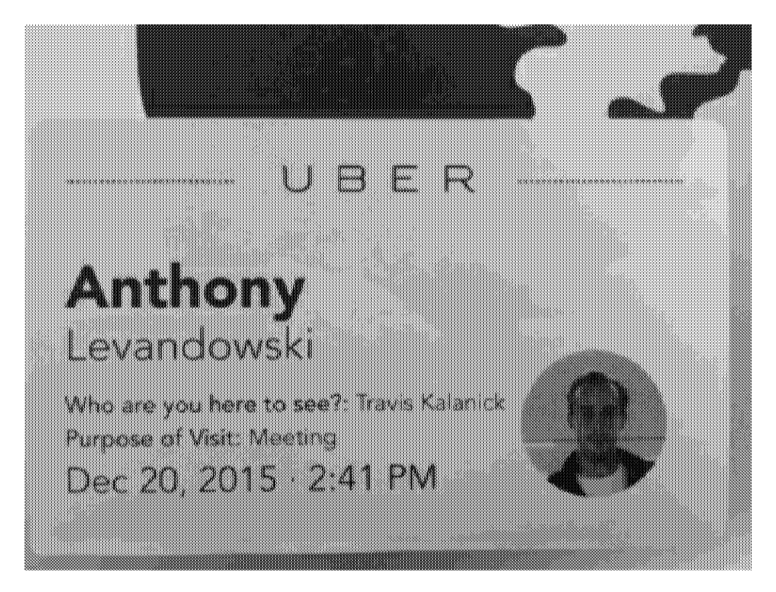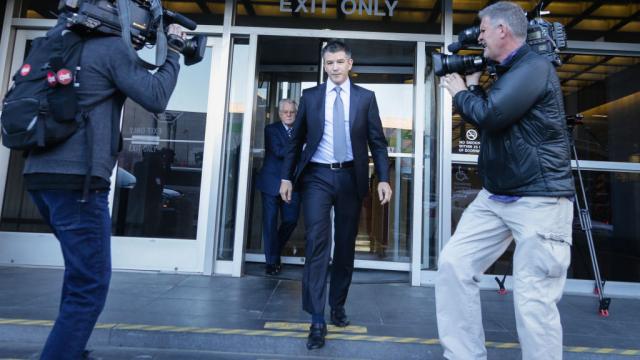Travis Kalanick and Anthony Levandowski both believed that they were several moves ahead of everyone else involved in the autonomous vehicle revolution.
Photo: Getty
Today, the pair loom large in a legal battle between Waymo, Google’s self-driving vehicle subsidiary, and Uber, which Kalanick ran as CEO until his ouster last June. The companies are currently fighting in court over a Waymo lawsuit that alleges Levandowski, a former Waymo engineer, fed trade secrets stolen from Waymo to Uber, which allegedly used them to zip to the front of the pack in the self-driving vehicle market.
The trial, which began this week in the US District Court in San Francisco, has unearthed the tumultuous relationships between the key players in the battle to dominate the future of autonomous vehicles.
Text messages between the pair that have been made public in the case reveal a friendly relationship, and Kalanick, the former CEO of Uber, said he often referred to Levandowski as a brother from another mother. But during testimony this week before a US federal court in San Francisco, Kalanick seemed to paint himself as a patient parental figure, one who allowed Levandowski to feel as though he got a cookie because it would get Kalanick closer to his own end goals.
Levandowski wanted to start his own company, Kalanick explained, while his goal was to hire Levandowski as an employee at Uber. “I wanted to hire Anthony and he wanted to start a company, so I tried to come up with a situation where he could feel like he started a company and I could feel like I hired him,” Kalanick testified on Tuesday.
Levandowski left Google in January 2016, after he’d already been meeting with Kalanick regularly to discuss working with Uber. In court, Waymo proudly displayed a visitor’s badge Levandowski used to meet with Kalanick at Uber’s offices in December 2015 as proof of their burgeoning relationship.

Levandowski went on to co-found Otto, a self-driving truck company that launched in May 2016 and was snapped up by Uber just a few months later, in August of that year. Behind the scenes, Uber was moving to acquire the brand-new company – several months before Otto’s official launch, Uber had already commissioned a due diligence report that investigated Otto, Levandowski, and four other key employees who had departed Google for the startup. In April, Kalanick signed acquisition paperwork to move the deal forward. By the time Otto’s trucks debuted, they’d already been sold.
Before the papers were signed, however, tensions between Kalanick and Levandowski had already begun. In a January 2016 text to Lior Ron, an Otto co-founder who also worked at Google, Levandowski floated the option to “destroy” Kalanick if Uber failed to deliver the deal terms they were after.
A spokesperson for Kalanick did not yet respond to our request for comment.
Uber and Google are rivals in the race to build self-driving cars, but that corporate rivalry was the output of a more personal one between Kalanick and Larry Page, the CEO of Google’s parent company Alphabet.
Page championed Google’s early efforts to build a self-driving car and was invested in keeping Levandowski at the company. When Uber launched its autonomous vehicle team with employees poached from Carnegie Mellon, Page was furious, Kalanick claimed.
“Larry was fairly upset with us about acquiring the CMU team and starting an autonomy effort for ourselves that competed with what they were doing,” Kalanick said. “He sort of was a little angsty and said, ‘Why are you doing my thing?’”
When Google first invested in Uber in 2013, Kalanick said he viewed Page and Google’s chief legal officer, David Drummond, as older brothers and chased after them, trying to get more attention than they were willing to give. But that relationship soured over time as Page refused to agree to a partnership with Uber. “Larry made it very clear that he was upset with us and not happy that we were doing autonomy,” Kalanick testified. “Generally, Google was super not happy, un-pumped, about us doing this.”
The relationship with Drummond broke down, too – Drummond resigned from Uber’s board in 2016 because of the conflict of interest between the two companies on self-driving cars.
When Levandowski raised complaints about Waymo’s work on autonomous vehicles, he contacted Page rather than his boss, Waymo CEO John Krafcik.
“We’re loosing our tech advantage fast,” Levandowski wrote. (In emails and text messages disclosed in court, Levandowski regularly misspelled “lose”.) Ron testified on Wednesday that he helped Levandowski draft the email to Page.
“Part of our team seems to be afraid to ship,” Levandowski griped to Page. “We should outfit more cars today that will be able to drive unmanned when the software is ready in the future. Uber has a huge business lead and we will need every time advantage we have to deploy our cars and convert the public to our service.”
When Levandowski emailed his complaints to Page, he had already downloaded 14,000 files related to self-driving car technology from a Waymo server. Weeks after sending the email, Levandowski resigned without notice from Google.
